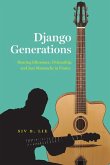"The distinctive sound of the swing-driven guitar style of Django Reinhardt has become almost synonymous with a carefree, bohemian Frenchness to fans all over the world. However, we in the US refer to his music using a telling designation: Django is known here as the father of gypsy jazz. In France, the cultural significance of the musical style--called jazz manouche in reference to his origins in the Manouche subgroup of Romanies (known pejoratively as "Gypsies")--is fraught both for the Manouche and for the white French men and women eager to claim Django as a native son. In Django Generations, ethnomusicologist Siv B. Lie explores the complicated ways in which Django's legacy and jazz manouche express competing notions of what it means to be French. Though jazz manouche is overwhelmingly popular in France, Manouche people are more often treated as outsiders. However, some Manouche people turn to their musical heritage to gain acceptance in mainstream French society. Considering all of the characteristics and roles attributed to Django--as a world-renowned jazz musician, as an artistic pioneer, as a representative of French heritage, and as a Manouche--jazz manouche becomes a potent means for performers and listeners to articulate their relationships with French society, actual or hoped-for. Weaving together a history of jazz manouche and ethnographic fieldwork undertaken in the bars, festivals, family events, and cultural organizations where jazz manouche is performed and celebrated, Lie offers insight into how a musical genre can channel arguments about national and ethnoracial belonging. She argues that an uncomfortable cohabitation of Manouche identity and French identity lies at the heart of jazz manouche, which is what makes it so successful and powerful"--
Hinweis: Dieser Artikel kann nur an eine deutsche Lieferadresse ausgeliefert werden.
Hinweis: Dieser Artikel kann nur an eine deutsche Lieferadresse ausgeliefert werden.








